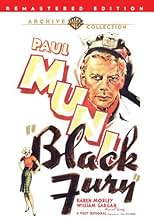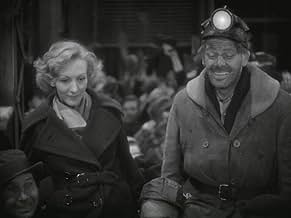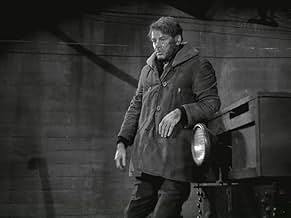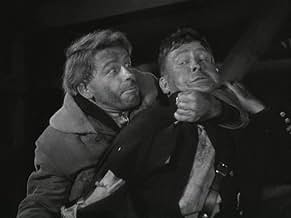IMDb RATING
6.5/10
1.1K
YOUR RATING
An immigrant coal miner finds himself in the middle of a bitter labor dispute between the workers and the mine owners.An immigrant coal miner finds himself in the middle of a bitter labor dispute between the workers and the mine owners.An immigrant coal miner finds himself in the middle of a bitter labor dispute between the workers and the mine owners.
- Nominated for 1 Oscar
- 2 wins & 2 nominations total
John Qualen
- Mike
- (as John T. Qualen)
J. Carrol Naish
- Steve
- (as J. Carroll Naish)
Joseph Crehan
- Farrell
- (as Joe Crehan)
Sara Haden
- Sophie Shemanski
- (as Sarah Haden)
G. Pat Collins
- Lefty - Company Policeman
- (as George Pat Collins)
6.51.1K
1
2
3
4
5
6
7
8
9
10
Featured reviews
Black Fury- Incisive Labor Film ***
The fabulous Paul Muni gives another wonderful performance in this 1935 film.
With a genuine Slavic accent, Muni is superb as a coal miner who loses his girl (Karen Morley) to a company Policeman and goes on a drinking binge as a result. It is at this point that a gangster organization tries to create chaos within the union and Muni becomes their perfect foil.
J. Carrol Naish is excellent as the worker who works for this unholy organization.
Naturally, Muni's best friend is killed in a clash with company police and Muni, now sober, vows revenge.
Morley returns to Muni just in time as he goes down into the mine and starts blowing the place up. It's at this point that the film starts to go down, but with Muni's performance and the problems shown of what the coal miners had to endure plus the dishonesty in trying to break the union, all make for a very good film.
With a genuine Slavic accent, Muni is superb as a coal miner who loses his girl (Karen Morley) to a company Policeman and goes on a drinking binge as a result. It is at this point that a gangster organization tries to create chaos within the union and Muni becomes their perfect foil.
J. Carrol Naish is excellent as the worker who works for this unholy organization.
Naturally, Muni's best friend is killed in a clash with company police and Muni, now sober, vows revenge.
Morley returns to Muni just in time as he goes down into the mine and starts blowing the place up. It's at this point that the film starts to go down, but with Muni's performance and the problems shown of what the coal miners had to endure plus the dishonesty in trying to break the union, all make for a very good film.
Paul Muni tour de force
In 'Black Fury', Paul Muni gives one of his best performances, and also appears on screen in one of his more plausible make-ups. This time he plays a Slavic immigrant, uneducated but keenly intelligent, working in an American coal mine. Muni's hair is dyed blond, yet looks realistic, and his own Eastern European facial features work with this characterisation ... not against it, as they did for some of his other roles. The film also features a fine performance from John Qualen, a prolific character actor whose film appearances were often marred by unconvincing and unnecessary foreign accents of the "yumpin' yiminy!" sort. In 'Black Fury', Qualen's flavour-of-the-month accent is less obtrusive than usual, and it actually works for the character he plays: a Polish-American miner.
Joe Radek (Muni) is a miner in a 'company town', where all the labourers are poorly-paid and live in squalid shanties. Radek and his fellow miners work in extremely dangerous conditions. The company that owns the mine also owns all the local businesses, and the local police force also work for the mining company. The cops have no interest in justice: they're bullies whose only concern is to keep the locals quiet and subservient to the company. The head cop is a slimy sadist named McGee, well-played by Barton MacLane. Radek's buddy Shemanski (Qualen) gets drunk one night and makes the mistake of criticising company policy: staggering home that night, he has a fatal 'accident' arranged by McGee's goons.
To call attention to various grievances, Radek fills the mineshaft with dynamite. He packs several days' worth of food for himself, then he takes McGee hostage at gunpoint and brings him into the mine. Radek chains McGee to the pit face, slightly out of reach of Radek's food supply. If Radek's demands aren't met, he's going to blow up the mine ... with himself and McGee inside. After they've been in the mine for several days, there's one harrowing shot of the starving McGee chained to the wall, begging Radek for food. The film ends with one of those slam-bang action climaxes that Warner Bros did so well, spiced with some social commentary that doesn't get too preachy.
The film boasts an excellent supporting cast, filled with actors who are (mostly) more obscure than usual, which helps us to immerse ourselves in the action. Karen Morley, quietly beautiful, gives a fine performance, and Michael Curtiz (a very underrated director) does his usual superlative work.
'Black Fury' is based on a story by Michael A. Musmanno, a Pennsylvania lawyer of Italian descent. Late in his life, Musmanno devoted several decades to writing a book called 'Columbus *WAS* First' (his emphasis), which purported to prove that no European explorers reached the Americas before Columbus. Musmanno's claims for Columbus have long since been disproven, but 'Black Fury' is an excellent film. I'll rate this movie 9 points out of 10.
Trivia note: Shortly after this movie was released, Warner Brothers released a Loony Toon starring Porky Pig as a hunter who had a dog named Black Fury. What a shameless plug!
Joe Radek (Muni) is a miner in a 'company town', where all the labourers are poorly-paid and live in squalid shanties. Radek and his fellow miners work in extremely dangerous conditions. The company that owns the mine also owns all the local businesses, and the local police force also work for the mining company. The cops have no interest in justice: they're bullies whose only concern is to keep the locals quiet and subservient to the company. The head cop is a slimy sadist named McGee, well-played by Barton MacLane. Radek's buddy Shemanski (Qualen) gets drunk one night and makes the mistake of criticising company policy: staggering home that night, he has a fatal 'accident' arranged by McGee's goons.
To call attention to various grievances, Radek fills the mineshaft with dynamite. He packs several days' worth of food for himself, then he takes McGee hostage at gunpoint and brings him into the mine. Radek chains McGee to the pit face, slightly out of reach of Radek's food supply. If Radek's demands aren't met, he's going to blow up the mine ... with himself and McGee inside. After they've been in the mine for several days, there's one harrowing shot of the starving McGee chained to the wall, begging Radek for food. The film ends with one of those slam-bang action climaxes that Warner Bros did so well, spiced with some social commentary that doesn't get too preachy.
The film boasts an excellent supporting cast, filled with actors who are (mostly) more obscure than usual, which helps us to immerse ourselves in the action. Karen Morley, quietly beautiful, gives a fine performance, and Michael Curtiz (a very underrated director) does his usual superlative work.
'Black Fury' is based on a story by Michael A. Musmanno, a Pennsylvania lawyer of Italian descent. Late in his life, Musmanno devoted several decades to writing a book called 'Columbus *WAS* First' (his emphasis), which purported to prove that no European explorers reached the Americas before Columbus. Musmanno's claims for Columbus have long since been disproven, but 'Black Fury' is an excellent film. I'll rate this movie 9 points out of 10.
Trivia note: Shortly after this movie was released, Warner Brothers released a Loony Toon starring Porky Pig as a hunter who had a dog named Black Fury. What a shameless plug!
10kcfl-1
Best film of year
Let's look at 1935: I don't think there's anyone reviewing now who went to the movies that year, so we have to rely on video. I've seen about 100 films from that year; many have not been preserved. "The Informer"won the Oscar, and a worthy film it was. "A Night at the Opera," "ChinaSeas," "The Good Fairy" "Lives of a Bengal lancer," "Naughty Marietta,"and "The Devil Is a Woman" also came out that year, all great films. "Black Fury" was better than any of them. It's gripping from the first frame to the last. It's as realistically set, and politically sensitive, as any Hollywood film. The closest political thriller I've seen to it is "Massacre" (1934). I loved it for the big factors, like digging itself into an impossible hole, then managing to escape, and Muni's performance. Also for the small ones, like all the supporting performances and the fact that the union happens to be integrated.
Partly watchable but leading performance and poor production values hamper this one.
"Black Fury" was the only time Paul Muni worked with Michael Curtiz. Potentially, this film could have been great but it is far from that. Muni wasn't very keen on acting in films, his preference was always going to be the theatre. He wasn't able to tone down his acting style for the cinema for the most part and he often appeared to be playing a caricature. He is guilty of this in the film "Black Fury." He is too theatrical in his facial expressions, his body language etc. Paul Muni plays a simple but honest coal miner who unwittingly becomes involved in a bitter dispute between the workers and the management. Muni, along with other miners, is subjected to intimidation. Barton MacLane is cast as a villain (he usually was) who is sent to destroy the livelihood of all the coal miners in this small community. Technically, the film is a disappointment. It is all too obvious that the sets representing the town in question are all on a soundstage. The sets don't look real and the direction from Michael Curtiz tends to suffer. The story itself is actually quite good and the film maintains a steady pace. The climax is also effective.
From The Working Class Studio, A Film For The Working Man
During the Thirties Warner Brothers had the reputation of being the working class studio and it was films like Black Fury that made for Warner Brothers that reputation. It was rare indeed to see another studio take stories about ordinary working people. Mostly they concentrated on the middle and upper classes because film was a form of escapism during the Depression. Black Fury coming out as it did in the middle of the New Deal was a timely reminder of the difficulties organized labor faced. Not coincidentally 1935 was the year that the Wagner Labor Relations Act was passed, an effort finally by the government to give labor some kind of equal footing with management. The need of the Wagner Act was to correct some of the abuses shown in films like Black Fury.
Paul Muni plays happy go lucky immigrant coal miner Joe Radek. A man admittedly who works hard and no one thinks of as any kind of brain. He gets used good and proper by the company to stir up the miners so they will strike and give the company an excuse to lock out the union and bring in scabs.
What you see with those miners living on subsistent wages in company towns was taken right from current headlines. It may be ancient history to us now, but it was very real for those people back in the day. The Pinkertons as represented by brutal and corrupt company policeman Barton MacLane had an unsavory reputation as strikebreakers and enforcers for management. That too is no exaggeration.
Muni, aided and abetted by former girl friend Karen Morley now seeing the error of some of her ways, sees what a chump he's been and takes some real direct action against the employers. It's spectacular I'll tell you that.
Though his acting style seems to have not worn well with some, not with me mind you, Muni was given a really rare tribute that year. His performance as Joe Radek was the second time a performer had a sustained write-in campaign for him for an acting Oscar. He finished second in the balloting to Victor McLaglen for The Informer and ahead of Mutiny of the Bounty nominees, Clark Gable, Charles Laughton, and Franchot Tone. The following year the Academy banned write-ins and that's been so ever since. Of course the following year Muni won his Oscar for The Story of Louis Pasteur.
We've moved on in America from an industrial to an information based society and films like Black Fury are now part of history. But it's a history we should not forget.
Paul Muni plays happy go lucky immigrant coal miner Joe Radek. A man admittedly who works hard and no one thinks of as any kind of brain. He gets used good and proper by the company to stir up the miners so they will strike and give the company an excuse to lock out the union and bring in scabs.
What you see with those miners living on subsistent wages in company towns was taken right from current headlines. It may be ancient history to us now, but it was very real for those people back in the day. The Pinkertons as represented by brutal and corrupt company policeman Barton MacLane had an unsavory reputation as strikebreakers and enforcers for management. That too is no exaggeration.
Muni, aided and abetted by former girl friend Karen Morley now seeing the error of some of her ways, sees what a chump he's been and takes some real direct action against the employers. It's spectacular I'll tell you that.
Though his acting style seems to have not worn well with some, not with me mind you, Muni was given a really rare tribute that year. His performance as Joe Radek was the second time a performer had a sustained write-in campaign for him for an acting Oscar. He finished second in the balloting to Victor McLaglen for The Informer and ahead of Mutiny of the Bounty nominees, Clark Gable, Charles Laughton, and Franchot Tone. The following year the Academy banned write-ins and that's been so ever since. Of course the following year Muni won his Oscar for The Story of Louis Pasteur.
We've moved on in America from an industrial to an information based society and films like Black Fury are now part of history. But it's a history we should not forget.
Did you know
- TriviaThough it received no official Oscar nominations, the Academy permitted write-in candidates this year and when the voting order was announced it turned out that Paul Muni had come in second in the balloting, narrowly behind winner Victor McLaglen but ahead of any of the other nominated actors.
- GoofsAt c. 24 minutes Joe is counting out his money, but he is inconceivably inaccurate. After counting to 68 dollars he places two further bills on the table and counts "73" out loud. A few moments later he counts up to 75 dollars, but, after four more bills have been placed in front of him he announces "76" dollars as his total.
- ConnectionsFeatured in Hollywood and the Stars: The Angry Screen (1964)
- SoundtracksWhy Do I Dream Those Dreams?
(1934) (uncredited)
Music by Harry Warren
Played on piano in bar during scene where men challenge Radek
Details
- Release date
- Country of origin
- Language
- Also known as
- Black Hell
- Filming locations
- Warner Ranch, Calabasas, California, USA(mine shaft scenes)
- Production company
- See more company credits at IMDbPro
- Runtime
- 1h 34m(94 min)
- Color
- Sound mix
- Aspect ratio
- 1.37 : 1
Contribute to this page
Suggest an edit or add missing content








































